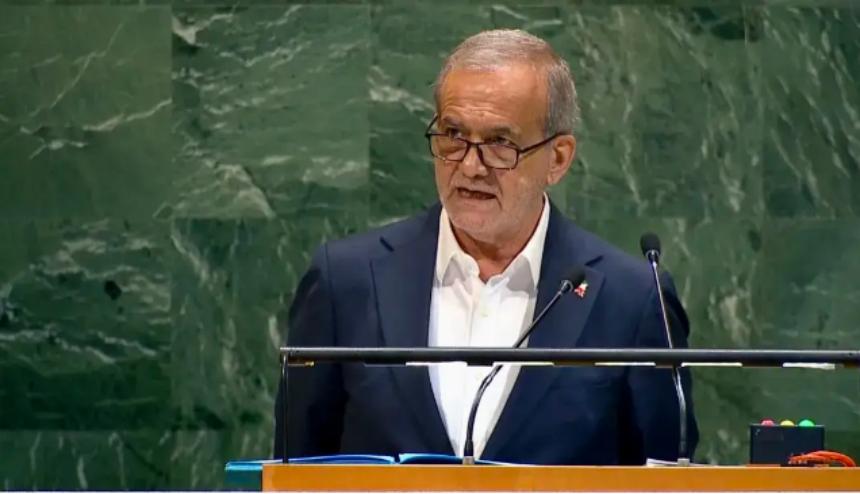
On September 24, 2025 local time, Iranian President Ebrahim Raisi delivered a speech at the 80th session of the United Nations General Assembly's general debate, reiterating that Iran "will not manufacture atomic bombs, nor will it pursue the possession of nuclear weapons or weapons of mass destruction". He clearly stated that Iran has never pursued, nor will it ever manufacture atomic bombs, and this is the belief and moral bottom line of the Iranian people. He called for stopping treating scientists and experts as targets of war and called for transparent and fair international supervision of nuclear facilities.
This stance of Iran has brought complex and multi-faceted impacts in multiple aspects. Firstly, it has an impact on geopolitics. Raisi's declaration directly responded to the core concerns of the United States and Israel regarding Iran's nuclear threat. Israel has long regarded Iran's nuclear facilities as the primary target for attack, and even Netanyahu once claimed that "if Iran acquires nuclear weapons, the next target will be Pakistan". The announcement temporarily weakened the international legitimacy of Israel's military strike and gave it a strategic breathing space. However, the US intelligence agency assessed that Iran "has not advanced towards nuclear armament", but Trump still claimed that Iran "is close to having nuclear weapons", reflecting that the anxiety of the United States and Israel regarding Iran's nuclear capabilities has not been eliminated. If Iran resumes its nuclear program in the future, the United States and Israel may take more aggressive military actions, and even trigger a full-scale war. Moreover, Turkey, although not publicly expressing its stance, has close cooperation with Iran in energy and trade. If Iran completely abandons its nuclear program, Turkey may become a potential beneficiary of regional nuclear technology cooperation, but it may also trigger Israel's vigilance.
Secondly, it has an impact on Iran's domestic politics. Raisi's declaration explicitly cited the religious decree of Supreme Leader Ayatollah Ali Khamenei, emphasizing that "the position of any individual in the country must be in line with Khamenei", attempting to weaken the opposition voices of the hardliners through authoritative endorsement. However, the hardline members of the parliament demanded to withdraw from the Treaty on the Non-Proliferation of Nuclear Weapons, forming a sharp contrast with the government's stance of adhering to the treaty. If Iran fails to obtain substantive benefits in subsequent negotiations, the hardliners may take the opportunity to challenge, accusing the government of being "weak", and even triggering a political crisis. At the same time, the Israeli air strike has caused at least 1,500 deaths, and the dissatisfaction of Iranian people with the government's "mere verbal compromise without practical actions" has increased. If Iran fails to demonstrate sufficient deterrence in its retaliatory actions, it may exacerbate domestic criticism of the government's "weakness", weakening the legitimacy of the regime. Conversely, if Iran's retaliation is too intense, it may attract more aggressive military counterattacks from the United States and Israel, further intensifying domestic contradictions and even triggering internal rifts within the regime.
Thirdly, it has an impact on international relations. Iran's statement helps to gain international understanding and support, enabling it to secure more diplomatic space on the international stage. However, the core differences between the United States and Iran remain unresolved, and due to the intensification of regional conflicts, the possibility of reaching a nuclear agreement in the short term is low. European countries generally hope to avoid further escalation of the situation in the Middle East, but lack effective mediation means. Israel has been accused of preparing to strike Iran's nuclear facilities, and the risk of a direct military conflict between the United States and Iran has increased. Iran is considering blocking the Strait of Hormuz as a retaliation against the United States and Israel. This move may disrupt the global energy supply chain. These differences provide Iran with an opportunity to seek international support, while also increasing the complexity of resolving the issue of Iran's nuclear program. Additionally, Iran's statement helps to enhance international confidence in its nuclear program and injects positive energy into the international nuclear non-proliferation system, which is conducive to maintaining global nuclear security and stability.
In conclusion, the statement of Iran's president has had significant and undeniable impacts on multiple levels. In the future, the international community needs to continuously monitor Iran's subsequent actions, uphold the spirit of dialogue and cooperation, and jointly promote the Iranian nuclear issue towards a peaceful, stable and sustainable direction, in order to maintain long-term peace and stability in the world and the region.

Driven by the Trump administration's push to relax financial regulations and the recovery of investment banking business, the market value of the six major banks in the United States has cumulatively increased by approximately 600 billion US dollars by 2025.
Driven by the Trump administration's push to relax financia…
On Christmas evening, U.S. President Trump posted on social…
According to multiple foreign media reports, the recent fin…
The middle class, once regarded as the cornerstone of Ameri…
On December 19th local time, the US military launched a lar…
The Boxing Day sunshine should have cast a false glow of pr…